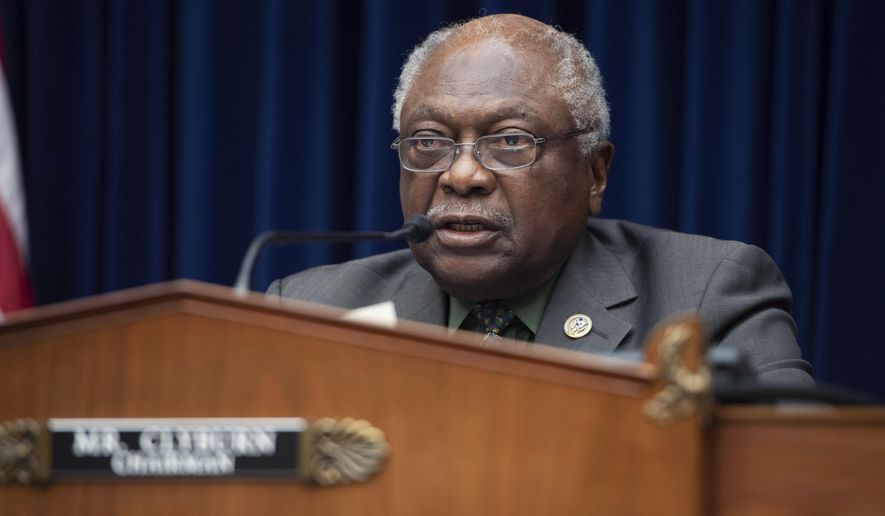House Majority Whip James E. Clyburn on Sunday said Democrats will continue to fight for a pair of election bills that are stalling out in the Senate, where key centrists do not want to blow up the filibuster in the evenly divided chamber.
The bills passed the House, but Democratic Sens. Kyrsten Sinema of Arizona and Joe Manchin III of West Virginia oppose weakening rules that require a 60-vote threshold to end debate and move forward on bills.
Asked if he believes the voting measures are dead, Mr. Clyburn said: “No, I don’t.”
“They may be on life support,” he told CNN’s “State of the Union.” “We’re not giving up.”
President Biden met with Ms. Sinema and Mr. Manchin last week, but neither of them seemed ready to move off their opposition to weakening the filibuster, warning that Democrats will need the power to block measures if they return to the minority.
Mr. Clyburn, appearing on NBC’s “Meet the Press,” said Democrats might have to go back to the drawing board and find measures that some Republicans can support. But he wants the Senate to try to move the existing bills forward even if it shines a light on Democratic disunity.
“When people tell me they are for this legislation, but they’re against the processes that we need in order to get the legislation, then I don’t think you’re on the right side of history. So we ought to fight. We’ve got to have these votes. We’ve got to see which side people are on,” Mr. Clyburn said.
Ms. Sinema’s speech against changing the rules enraged liberal activists, and former Secretary of State Hillary Clinton appeared to jeer her and Mr. Manchin by repeating the late Martin Luther King Jr.’s warnings about “the White moderate.”
Mr. Clyburn stopped short of urging Rep. Ruben Gallego, Arizona Democrat, to launch a primary challenge against Ms. Sinema in 2024 but sang his praises.
“We’ll see what happens. He’s a good guy,” he said of Mr. Gallego.
Democrats say their voting bills are needed to overrule a slew of election integrity measures that have been enacted in GOP-led states since 2020.
The Freedom to Vote Act would require states to offer same-day voter registration, make Election Day a national holiday and mandate 15 days of early voting. It also would require universal vote-by-mail, create a taxpayer-backed public-financing system for House elections and impose new restrictions on the ability of states to draw their electoral districts.
The John Lewis Voting Act would grant the Department of Justice sweeping new powers to oversee state elections. In some cases, according to the bill, states would even have to secure the DOJ’s approval before implementing new voting laws.
Mr. Biden spoke in support of the bills in a fiery speech in Atlanta ahead of the MLK Day holiday that enraged Republicans.
Mr. Clyburn dismissed critics who said the president went too far compared the choice on voting reforms to choosing between Abraham Lincoln or Confederacy leader Jefferson Davis.
“I would ask those people, what do you think is going too far? Is it criminalizing giving someone a bottle of water when standing in line to vote?” Mr. Clyburn said, referring to one of the state restrictions Democrats oppose.
“If we do not protect the vote with everything we’ve got, we will not have a country to protect,” Mr. Clyburn said. “That’s Third World stuff, and we better be careful.”
Sen. Bill Cassidy, Louisiana Republican, said that Mr. Clyburn’s comments about the water restrictions were misleading and that Mr. Biden has fallen short in his pledge to create unity.
Mr. Cassidy said some blue states have election laws that are more restrictive than new rules in red states and that things like drop boxes were supposed to be a one-off in 2020 because of the coronavirus.
“The accommodations made for a pandemic are going to continue the future when theoretically the pandemic is going to be over,” Mr. Cassidy told CNN.
• Haris Alic contributed to this report.
• Tom Howell Jr. can be reached at thowell@washingtontimes.com.




Please read our comment policy before commenting.